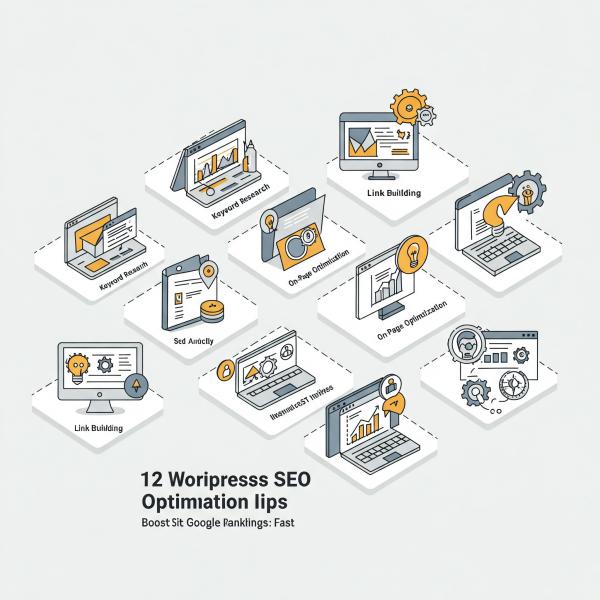Real-World WordPress SEO Optimization Tips That Actually Work
If you’ve ever felt like running a WordPress site is more juggling act than creative passion, you’re not alone. Between plugin hiccups, theme troubles, and Google’s ever-shifting algorithms, it can feel impossible to keep up. But here’s the truth: solid SEO is far more within reach than most people think—especially with the right strategies in place.
Whether you’re blogging for fun or building a business, the right WordPress SEO optimization tips can transform your site from invisible to unmissable. Let’s dig into the essentials that actually move the needle—without overwhelming you in the process.
“Content is king, but SEO is the crown that helps it rule.” – Anonymous
Your Theme Matters More Than You Think
A cluttered, code-heavy, or outdated theme can seriously slow your site and tank your search rankings. Choose a lightweight, SEO-friendly theme that loads fast and scales beautifully on mobile. Favorites like Astra, GeneratePress, or Kadence balance aesthetics with speed.
- ✅ Mobile-responsive
- ✅ Schema integration
- ✅ Clean, SEO-compliant code
Pick One Good SEO Plugin (And Learn It Well)
Bloat kills performance. Instead of overloading on plugins, choose one comprehensive SEO plugin that suits your workflow. Top options include:
- Yoast SEO: Great for beginners
- Rank Math: Powerful with advanced features
- All in One SEO: Underrated but highly effective
Whichever you pick, take time to understand it—setting up the basics right makes a huge difference.
Use Clean, Keyword-Friendly URLs
A pretty URL is more than aesthetics—it helps search engines (and users) understand your content. Go to Settings → Permalinks in WordPress and choose “Post name” to keep things tidy and readable:
Instead of: yoursite.com/?p=12980
Use: yoursite.com/wordpress-seo-optimization-tips
Write for Humans First—SEO Second
Your content should feel like a genuine conversation, not a keyword dump. Use your main keyword naturally, but always prioritize clarity and value.
- ✅ Short paragraphs
- ✅ Subheaders for scannability
- ✅ Bullet points for clarity
- ✅ Your voice—authentic and relatable
Strategic Keyword Placement (Without Being Obvious)
Place your focus keyword (e.g., WordPress SEO optimization tips) in a few essential spots:
- Title
- URL
- First paragraph
- Meta description
- At least one subheading
Then, let the rest flow naturally. Keywords aren’t a checklist—they’re a compass.
Optimize Images or Risk Speed Traps
Images play a big role in both user experience and SEO. Here’s how to handle them like a pro:
- ✅ Resize before uploading
- ✅ Compress with tools like Smush or ShortPixel
- ✅ Rename file names descriptively (e.g., wordpress-seo-chart.jpg)
- ✅ Always add descriptive alt text
Bonus Tip: Use WebP format for faster load times.
Link Internally—It’s Free SEO Power
Internal links help Google understand your site’s structure and keep visitors browsing longer. In every post:
- ✅ Add 2–4 relevant internal links
- ✅ Update older content with links to new articles
- ✅ Use clear, keyword-based anchor text
Submit Your Sitemap & Check Robots.txt
Your SEO plugin likely generates a dynamic sitemap at:
yoursite.com/sitemap_index.xml
Submit this through Google Search Console. Also, review your robots.txt to ensure critical pages aren’t being blocked from indexing.
Mobile Optimization Is No Longer Optional
With Google’s mobile-first indexing, a site that flops on phones will flop in ranking too. Check off these must-haves:
- ✅ Responsive theme
- ✅ No popups that block content
- ✅ Readable fonts & tappable buttons
Test your site using Google’s Mobile-Friendly Test.
Update Old Posts—Don’t Just Write New Ones
Got a blog post from a couple of years ago that still gets traffic? Don’t let it age out—refresh it!
- ✅ Add current stats or examples
- ✅ Replace broken links
- ✅ Update the publish date for freshness
This strategy alone has rescued several of my older posts from the second page of search results.
Earn Backlinks the Right Way
Backlinks remain a huge factor in Google ranking, but spammy outreach won’t cut it. Try these ethical tactics:
- ✅ Engage on discussions in Reddit or Quora
- ✅ Pitch valuable guest content
- ✅ Publish original research or tools others want to link to
- ✅ Build real relationships in your niche
Be Patient—SEO Wins Stack Over Time
If you’re consistent with smart tweaks and high-quality content, results usually show within 3–6 months. It’s a marathon, not a sprint—and it grows as you keep going.
You also don’t need expensive subscriptions. Free tools like Google Search Console, Ubersuggest, and Answer The Public can be game-changers for solo creators and small teams alike.
The Bottom Line: Start Simple. Stay Consistent. Get Found.
You don’t have to be an SEO expert to show up in search. These WordPress SEO optimization tips are straightforward, repeatable, and incredibly effective when done right.
Start with just a few changes—optimize a single post or update an old one. It adds up faster than you think.
Still stuck? Drop your SEO question in the comments—I’d love to help you get unstuck 👊

